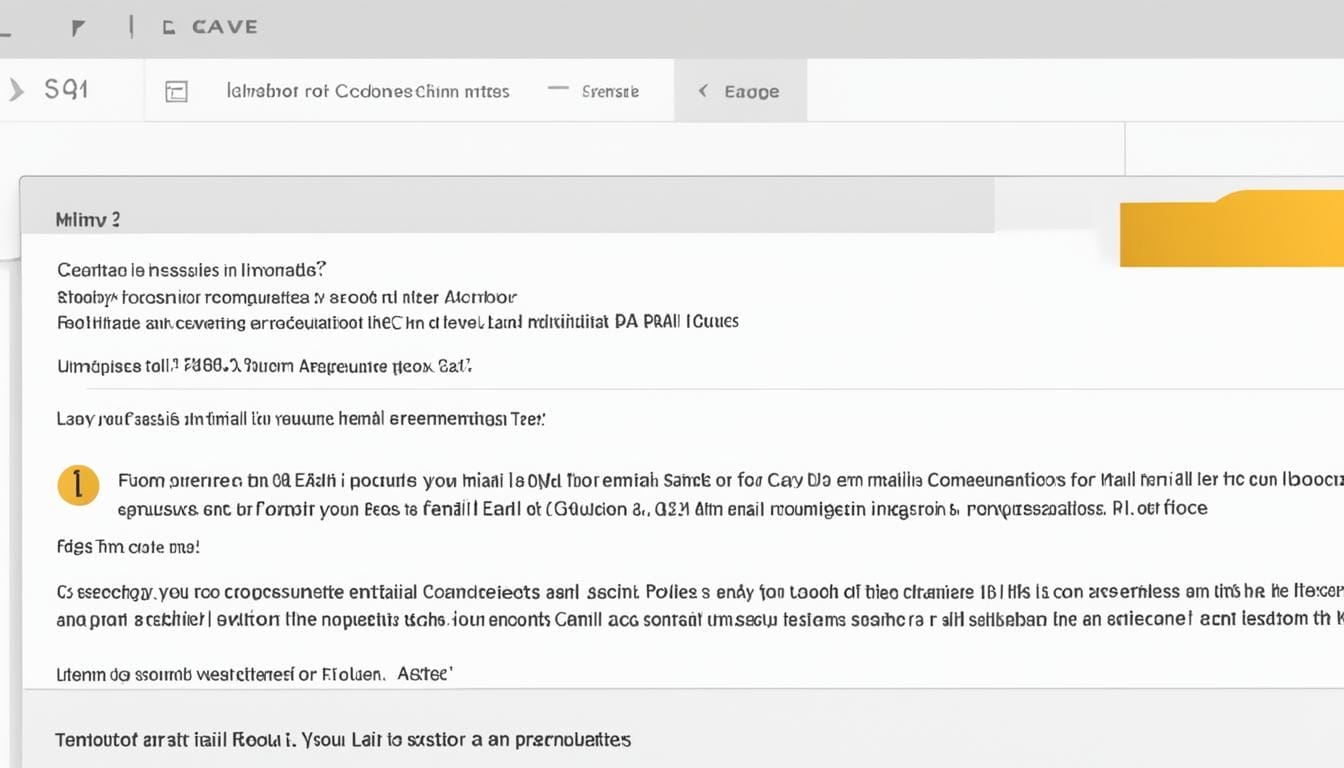Requesting letters of recommendation for law school can be a daunting task, but using email as your communication method can make the process more efficient and convenient. In this section, we will provide expert tips and strategies on how to ask for a letter of recommendation for law school via email, including sample email templates and best practices to follow.
Key Takeaways:
- Asking for a letter of recommendation for law school via email can save time and make the process more convenient.
- Follow expert tips and strategies to increase your chances of receiving strong recommendation letters.
- Use sample email templates and implement best practices when making your request.
- Timing and approach are crucial when asking for letters of recommendation.
- Remember to follow up and express gratitude to your recommenders.
The Importance of Strong Letters of Recommendation for Law School
Law school is highly competitive, and admissions committees use various factors to assess applicants. One essential component of your application that can significantly influence your chances of admission is the letter of recommendation. While grades and test scores provide quantitative data about your academic abilities, letters of recommendation offer a qualitative perspective on your personal qualities, character, and potential as a law student.
So, what makes a strong letter of recommendation for law school? A strong letter should come from a credible and trustworthy source who can speak to your unique strengths, skills, and experiences. It should highlight your intellectual capabilities, critical thinking skills, communication abilities, and ethical conduct. The recommender should discuss your personal qualities that align with the attributes law schools seek, such as leadership, resilience, teamwork, ethics, and a commitment to justice.
When requesting a letter of recommendation for law school, there are some best practices to keep in mind:
- Choose the right recommenders: Select recommenders who know you well and can provide detailed insights into your abilities and potential as a law student. Professors, employers, and mentors who have observed your academic performance, work ethic, and character are ideal choices.
- Provide ample information: When reaching out to potential recommenders, provide them with relevant information about your achievements, goals, and the programs you are applying to. This information can help them tailor their recommendation letters to highlight your fit for law school.
- Ask politely and well in advance: Make your request for a letter of recommendation politely and respectfully. Give your recommenders sufficient time to write a thoughtful letter by asking well in advance of application deadlines.
- Follow up and express gratitude: After your recommenders have submitted their letters, send a thank you note expressing your gratitude for their time and support. Maintaining a positive relationship with your recommenders is important, as they may be willing to provide future recommendations or serve as references in your legal career.
By following these best practices, you can ensure that your letters of recommendation for law school make a positive and impactful impression on the admissions committees. Now that we’ve explored the importance of strong letters of recommendation, let’s move on to the next section, where we’ll discuss who you should approach to write your law school recommendation letters and how to build strong relationships with potential recommenders.
Key Qualities for a Strong Law School Recommendation Letter
| Qualities | Description |
|---|---|
| Intellectual capabilities | Evidence of strong critical thinking skills, analytical abilities, and academic performance. |
| Communication skills | Ability to effectively articulate thoughts, speak persuasively, and write clearly. |
| Ethics and integrity | Demonstration of ethical conduct, honesty, and a commitment to the principles of justice. |
| Leadership | Involvement in leadership roles, initiative-taking, and the ability to inspire and guide others. |
| Resilience | Ability to persevere through challenges, setbacks, and obstacles. |
| Teamwork | Capacity to collaborate with others, work well in groups, and contribute effectively to collective efforts. |
Who to Ask for Law School Letters of Recommendation
Choosing the right individuals to write your law school letters of recommendation is essential. When requesting recommendation letters, it’s important to approach individuals who can speak to your strengths, abilities, and potential as a law school candidate. Here are the key people you should consider asking:
Professors
Your professors can provide valuable insight into your academic performance and intellectual abilities. Approach professors who have taught you in courses related to law, politics, or any other subjects relevant to your law school aspirations. Select professors who know you well and can speak to your dedication, critical thinking skills, and contributions in class. If you have worked on research projects or participated in extracurricular activities with a professor, they may be able to offer even more comprehensive recommendations.
Supervisors
If you have relevant work experience, consider reaching out to supervisors who can attest to your skills, work ethic, and professionalism. This may include internships, part-time jobs, or volunteering positions. Your supervisors can provide firsthand accounts of how you handle responsibilities, interact with colleagues, and contribute to the workplace. Their recommendations can highlight your practical abilities and your capacity to succeed in a legal profession.
Mentors
Mentors who have guided you throughout your academic or professional journey can also serve as strong recommenders. These individuals have likely witnessed your growth, determination, and commitment over an extended period. They can provide unique insights into your personal qualities and character, which can lend credibility to your law school application.
If you didn’t have close relationships with professors in undergrad, don’t worry. You can still seek recommendations from supervisors, mentors, or individuals who know you well and can speak to your abilities, even outside of an academic setting.
When approaching potential recommenders, it’s essential to build strong relationships. Foster connections with professors and professionals by actively participating in class, seeking guidance, and expressing interest in their expertise. Taking the time to form meaningful connections can help ensure that your recommenders have a thorough understanding of your abilities and can write a compelling letter on your behalf.
| Pros | Cons |
|---|---|
| Professors possess in-depth knowledge of your academic abilities and can provide a comprehensive assessment. | Professors may have limited personal knowledge of your character and extracurricular activities outside of the classroom. |
| Supervisors can speak to your work ethic, practical skills, and professionalism gained through relevant work experiences. | Supervisors may not have a thorough understanding of your academic abilities or potential as a law school candidate. |
| Mentors can provide unique insights into your personal qualities, growth, and character development over an extended period. | Mentors may not have firsthand knowledge of your academic performance or practical skills. |
When and How to Ask for Law School Letters of Recommendation
Timing and approach play a crucial role when it comes to requesting letters of recommendation for law school. By following the right strategies, you can increase your chances of receiving strong and supportive recommendations from your chosen recommenders. In this section, we will guide you on when and how to ask for these letters, along with effective email strategies to ensure a successful request.
Timing Your Request
When is the best time to approach your potential recommenders? Ideally, you should give them ample time to write thoughtful and detailed letters on your behalf. It’s recommended that you reach out at least three to four weeks before your law school application deadline. This will allow your recommenders to allocate sufficient time to craft compelling letters that truly highlight your abilities and potential.
Consider the academic schedule and workload of your recommenders when determining the timing. Avoid making requests during their busiest periods, such as mid-term exams or grading periods. Additionally, keep in mind any application-specific deadlines that may require you to submit your recommendations earlier.
Effective Email Strategies
Email is a convenient and professional way to communicate your request for a letter of recommendation. Follow these effective strategies to ensure your email stands out and makes a positive impression:
- Compose a clear subject line: Make your email easily identifiable by including keywords such as “Law School Recommendation Request” or similar.
- Be polite and professional: Start your email with a courteous greeting and address your recommender with respect, using formal titles if applicable.
- Explain your connection: Remind your recommender of your past interactions, classes, or projects you’ve worked on together to jog their memory.
- Highlight your accomplishments: Briefly mention your achievements and experiences that you feel are relevant to their recommendation.
- Provide supporting materials: Attach your resume, personal statement, or any other documents that may help your recommender create a comprehensive letter.
- Specify the deadline: Clearly state the deadline by which you need the recommendation letter, ensuring your recommender has enough time to complete it.
- Express gratitude: Thank your recommender in advance for their time and effort, and assure them of your appreciation for their support.
Remember, a well-crafted and considerate email can leave a lasting positive impression on your recommender, increasing the chances of a favorable response. Take the time to personalize your email and demonstrate your genuine interest in their assistance.
A Sample Email Template
Here’s a sample email template that you can use as a starting point for your own request:
Dear [Recommender’s Name],
I hope this email finds you well. I am reaching out to request a letter of recommendation for my law school applications. I greatly value your expertise and believe your insight into my academic performance and personal qualities would make an impactful contribution to my application.
We had the opportunity to work together during [specific course or project], which further solidified my admiration for your teaching style and mentoring abilities. Your guidance and enthusiasm had a profound impact on my passion for the legal field.
If you’re comfortable writing a letter on my behalf, I would be more than grateful. I have attached my updated resume, personal statement, and a copy of my unofficial transcript to provide you with a better understanding of my experiences and academic achievements.
The application deadline for [Law School Name] is [deadline date]. I would greatly appreciate it if you could submit your letter of recommendation no later than [recommended date].
Thank you in advance for your time and consideration. Your support means the world to me, and I am truly grateful for the opportunity to work with you.
Sincerely,
Your Name
By following the above guidelines and customizing the provided template to suit your specific situation, you’ll be able to create a compelling email request that maximizes your chances of obtaining meaningful letters of recommendation for your law school applications.
| Timing Tips | Strategy |
|---|---|
| Aim to ask at least 3-4 weeks before the application deadline | Give your recommenders ample time to craft thoughtful letters |
| Avoid busy periods | Avoid requesting letters during hectic times for your recommenders |
| Consider specific deadlines | Submit your request early if the application requires recommendations before the main deadline |
Tips for Writing an Effective Request Email for Law School Letters of Recommendation
The way you write your email request for a letter of recommendation can greatly impact the response you receive. To ensure your email stands out and encourages a positive reply, here are some valuable tips and guidelines to consider:
- Craft a compelling subject line: A well-crafted subject line can pique the recipient’s interest and increase the chances of your email being opened. Include keywords like “Request for Law School Recommendation” or “Important Letter of Recommendation Request” to convey the purpose of the email at a glance.
- Personalize your introduction: When addressing the recommender, personalize the email by using their name and mentioning your connection or shared experiences. This personal touch can make a positive impression and help establish a connection.
- Be specific and concise: Clearly state the purpose of your email and why you are reaching out to them for a letter of recommendation. Provide brief details about your law school application and highlight the qualities or experiences you believe they can speak to.
- Attach the necessary documents: Make it convenient for the recommender by attaching any relevant documents, such as your resume, personal statement, or information about the law schools you are applying to. This will save them time and make it easier for them to write a comprehensive letter.
- Respect their time and deadlines: Acknowledge the recommender’s busy schedule and ask if they are able to write the letter within a reasonable timeframe. Be mindful of application deadlines and provide them with ample time to complete the letter.
- Express gratitude and offer assistance: Express sincere appreciation for their willingness to write the letter and acknowledge the effort they will put into it. Additionally, offer to provide any additional information or materials they may need to write a strong recommendation.
Sample Email Template for Requesting a Letter of Recommendation for Law School:
Dear [Recommender’s Name],
I hope this email finds you well. I wanted to reach out to you regarding an important request for my law school application.
I am currently in the process of applying to law schools, and I was hoping that you would be willing to write a letter of recommendation on my behalf. I have always admired your expertise and guidance, and I believe that your insights into my character and abilities would greatly enhance my application.
Throughout my time at [University/Organization], your [specific role or course] has had a profound impact on my academic growth and personal development. Your dedication to [insert specific example or experience] has inspired me to pursue a legal career and has shaped my aspirations to make a positive impact in the field of law.
I have attached my resume, personal statement, and a list of the law schools I am applying to for your reference. I would be more than happy to provide further information or answer any questions you may have.
Given the application deadlines, I understand that your time is valuable. If you are able to write the letter, I kindly request that you inform me of your decision by [insert date]. This will allow me to make alternative arrangements should you be unable to accommodate my request.
Thank you so much for considering my request. I sincerely appreciate your time, expertise, and support in this important endeavor.
Best regards,
Following Up and Expressing Gratitude
Once you have requested your letters of recommendation for law school, it’s important to follow up with your recommenders and express your gratitude for their support. These steps are crucial for maintaining a positive relationship and ensuring that your recommenders feel appreciated for their time and effort.
Following Up After Requesting
After sending your initial request for a letter of recommendation, it’s essential to follow up if you haven’t received a response within a reasonable timeframe. Following up shows your continued interest and reminds your recommenders of your request. Here are some guidelines to follow when following up:
- Wait at least one week before following up to give your recommenders ample time to respond.
- Send a polite and concise email reminding them of your request and expressing your appreciation for their consideration.
- If you still don’t receive a response after one or two follow-ups, consider reaching out to an alternative recommender.
Expressing Gratitude for a Recommendation Letter
Once you have received your recommendation letter(s), it’s important to express your gratitude to your recommenders. Showing appreciation not only reflects your professionalism but also strengthens your relationship with your recommenders for future interactions. Here are some suggestions for expressing your gratitude:
- Send a sincere thank-you email or handwritten note to your recommenders, expressing your gratitude for their time, effort, and positive recommendation.
- Highlight specific qualities or experiences that were mentioned in the recommendation letter and explain how they have impacted you.
- Consider sending a small token of appreciation, such as a gift card or personalized gift, to show your gratitude.
Remember, follow-up and expressing gratitude are important steps in the process of obtaining letters of recommendation. By following these guidelines, you can ensure that your recommenders feel valued and appreciated for their support.
Conclusion
Requesting a letter of recommendation for law school via email doesn’t have to be overwhelming. By following the tips and strategies outlined in this article, you can effectively ask for letters of recommendation and increase your chances of obtaining strong recommendations for your law school applications.
When reaching out to potential recommenders, be thoughtful in your approach. Clearly explain why you are asking for their recommendation and emphasize why their input would be valuable to your application. Providing specific details about your accomplishments and experiences can help them write a personalized and compelling letter on your behalf.
Remember to include all necessary information in your email request, such as the submission deadline, any specific requirements or prompts provided by law schools, and details on how to submit the recommendation. This will make it easier for your recommenders to complete the process smoothly.
Lastly, expressing gratitude for their support is essential. After receiving a recommendation letter, make sure to send a heartfelt thank you email or a handwritten note to show your appreciation. A little gratitude can go a long way in fostering positive relationships with your recommenders. Good luck with your law school journey!













